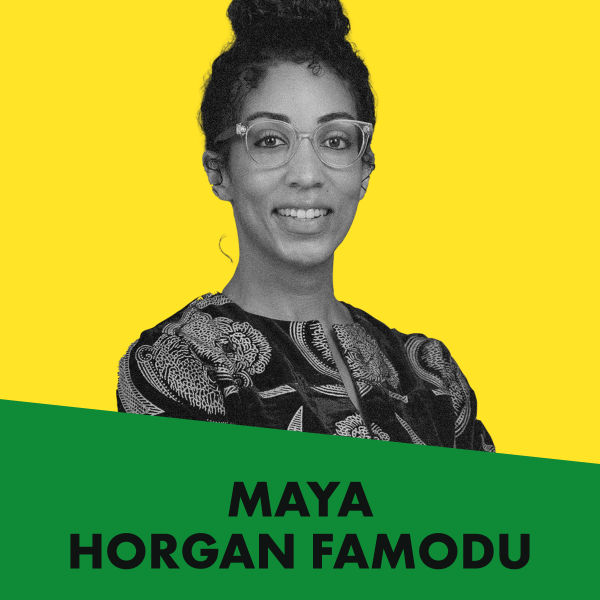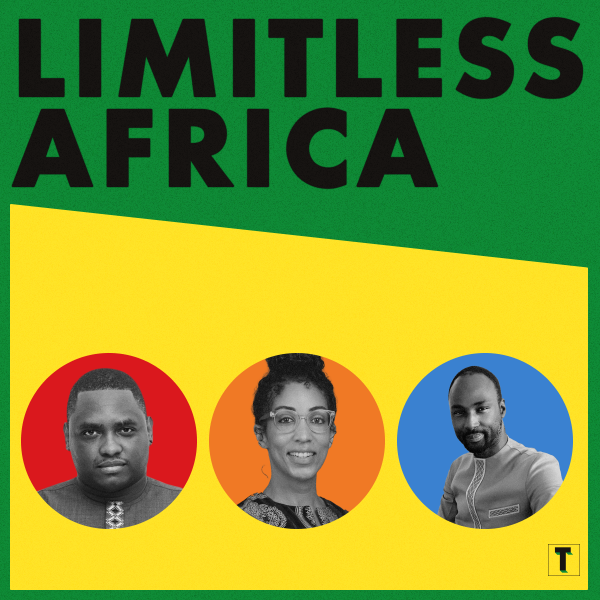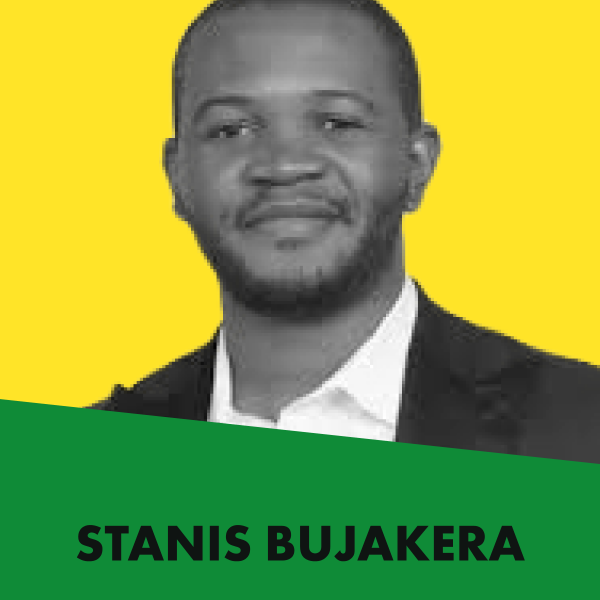Claude: Welcome to Limitless, the podcast that asks the questions that matter for Africa.
In each episode, we’re asking three guests one question that matters to Africans. We’re looking for African solutions to African problems.
The Limitless Podcast is supported by the U.S. Department of State and the Seenfire Foundation.
In this episode, I wanted to show all the amazing things women can do if they are given the opportunity. And this support can come from many places, from your community, your colleagues or even your competitors. Success itself can also come in many forms, in business, in family life, or in international sport. I speak to an award-winning entrepreneur, a renowned artist and an Olympic athlete about the importance of empowering women.
Gislaine Mateji is a Cameroonian entrepreneur and the CEO of Mumita, an agriculture startup which trains farmers to increase their crop yields. These farmers can be unreceptive to advice coming from a young woman. She started off by telling me how she succeeds in such a male-dominated environment.
Gislaine: The challenge of being a woman in this business is real, because you find yourself in a community where, when you come to negotiate or to talk with them, they will tell you, hey, women don’t talk to us. In this community, the woman should not talk when men are talking. So my co founders are men, and in this situation, they step in front and I step back and tell them, Okay, this is this is the vision of this is what we are here to do. So you talk to the men while I go ahead and talk to the women. At the end of the day, the company wins.
Claude: How much of this kind of independent spirit is driven by the fact that you’ve been confronted with other perspectives, even foreign perspectives, and how much of that perhaps, is driven by how you were raised in Cameroon.
Gislaine: This is a very personal question, and I think I’m going to thank my father first for this, because he has two four girls and two boys. Every one of his kids, this is the same education. They had never been a gender. So from there, I understood that, hey, what a guy can do I can do. The attitude does not depend on your gender. Now, going back into the community, you will hear, oh, a woman is not supposed to do this. You have to calm down. You have to get married. You have to stop running around. You have to run a family. You have to do this. That brings a setback into your head. But thank God that you resist an education which actually opens your mind to understand that, hey, a woman can do this. And in my family, my mom is the one who wants a family, the family businesses, not my dad. So I grew up with the mindset that a woman can run a business.
Going to the US, being in the US, you understand that the mindset is totally different. There is almost no gender segregation on your it’s about your attitude, and that that is something I bring back against my community. How to actually make them understand that it’s about what you can bring on the table, and not very much about your gender.
Claude: I’m wondering if you were going to give advice to other young women who might be teenagers now looking to get into this space in which you operate, what advice would you give them as they’re looking to succeed in the way that you are hopefully on your way to succeeding?
Gislaine: So I’m gonna give them free advice. First of all, be focused and be determined, because there are going to be challenges. There are going to be moments, a lot of moments of self doubt. There are going to be moments where you will think you were actually on the wrong path. That is the first
Okay, so the second one is your team, your immediate team. If you want to go big and if you want to go far, you must have too much. So now your teammates that you’re getting, it should be people who have the same vision as you.
And thirdly, you have to understand your reality, your environmental reality, because the realities in Africa are not the same realities out of the country, are not same realities everywhere you go. So you have to understand your realities, and still you focus on your goal. It’s not gonna be easy, not at all. There are moments you doubt yourself and you actually ask yourself if you’re on the right path, but if you set little milestones and you win the little battles you win. It just gives you more energy to say, Hey, okay, I want it. I can do this.
Claude: Delphine Diallo is a Senegalese French photographer who lives in New York City. Her photographs are powerful portraits of African women that re-imagine a matriarchal society – one where women are in charge. She has become ever more fascinated by the power of Senegalese women, which manifests itself in a very different way to women in New York, and I wanted to speak to her about it. Here’s our conversation.
Well, you often talk about these matriarchal societies, and you’re alluding to your grandmother, and I’m personally also very fascinated by these matriarchal societies in Africa, because we have them in Togo as well, even though the law insists on making these countries very patriarchal. What do you think is so powerful about these African women?
Delphine: Beyond the religion, for example, let’s say in Senegal, it’s Islam, right? I saw something very interesting in Senegal, where the women are still, you know, very leading the household. And, for example, my grandmother when I was 12. That’s the only time and I did travel to Senegal, I need to make the line in the family to see my grandmother, because people were waiting in line to talk to her and to ask her for advice, and I had to wait an hour. So when she she she met me, and she touched me. I was small, and she touched me in my front, and she blessed me. She blessed me with this power. I get the same name of her, like my middle name is Delphine Diao Diallo, and my grandmother is Diaogue, right? So you see how it actually informed my nature and my personality and they all knew me to understand the power of the Divine Feminine into different realities and spaces, black America, Afro-European, and then Senegal, and that, by doing this movement, I’m able to create this new idealistic idea of the matriarchal societies who’s been there 5000 years ago but disappeared.
Claude: One thing I remember about a specific wedding I attended in Dakar about a decade ago, one of my friends was getting married, and in the middle of the wedding ceremony, she disappeared with a group of women from three generations, and they disappeared for more than an hour, and I just couldn’t believe that she would just disappear right in the middle of the wedding. And then I asked somebody, where are they? I was told that it was a matriarchal convening. Basically the women from her mother’s generation, her grandmother’s Generation, were giving her advice on how to liberate herself, her own sexual health within the marriage, and how her life will be different as a wife and as a mother. And this is something that is transmitted behind closed doors in a ceremony that is just about truth and truth speaking. And so I want to ask you, maybe you can share certain things that you discovered about yourself as you started spending more time with your grandmother and your father’s family in Senegal?
Delphine: The power of the power of the matriarch for sure. And one of my cousin name is koly sec. She has five kids. She’s she has a husband who’s an Imam musaki. And I will go back to this family all the times to understand the relationship between the man and the woman, and then the power that the man giving to the woman to be able to to have the woman giving power to the kids, which means that the woman has so much power in Senegalese family.
Claude: Lastly, someone very different. Esti Olivier is a sportswoman and competitor in the Olympics this year in the canoe sprint. Being a world-class athlete entails many sacrifices. Some are harder than others in the African context. But her words of advice are inspiring. She spoke to our correspondent Esther Appai Fei.
So can you tell us who or what has been your greatest source of inspiration in your career?
Esti: I’ve had a few people that I’ve looked up to throughout my career. I don’t think I’ve ever had like a set role model or anything. But I’ve always kind of tried to take something from everyone that I’ve trained with, who have achieved.
When I was younger, I trained with the squad, the national squad, that was training for the Beijing Games, and that was quite a strong group of women. And was five women at that time, training together and pushing each other. And I was like, 14 or something, in the midst of these amazing women. And from then, I definitely, like, saw what it would take to be the best, and they’ve kind of instilled in me there a work ethic, so they kind of molded me into like a really determined person that’s really beautiful.
Esther: Do you think sports can change women’s lives? And what piece of advice would you have for young women?
Esti: Yeah, look, I definitely think sport can change your life. It opens up so many opportunities and experiences that you would you would never have in your traditional way of life. You know, I look at a lot of my friends and you know their lives which there’s nothing wrong with, obviously, but it’s it was school and it was varsity, and then they have a job, and they get married and they have kids, and they live happily ever after, and then I’m like, not that I had school, but I was almost never there. I was always busy with my sports and travelling the world and experiencing these extreme highs and these extreme lows, and I think going through emotional things that not a lot of people experience, disappointments that not a lot of people experience, and growing from that.
So it’s a different route, but it can definitely change your life. It can change your outlook on life, and I think it makes you so much stronger as a woman to have to balance everything. You know, I’m also a wife. I don’t have kids. Don’t have time for that at the moment, but it’s, it’s a different type of balance when you’re a female in professional sports, I think compared to male, and your timing and opportunities are a little bit different. And there are different things that you need to take into consideration as a female. You know, your biological clock and all those things, you have to keep in mind, you can’t just be doing sports all your life, if you do want a family. And it’s quite remarkable, because there’s a lot of athletes in my age category that have now become moms, and they still doing the sport full time. And I just admire them so much, because that’s tough. That’s tough again, being pregnant and then coming back into this high level sport and then raising the kids, that’s very tough.
But it just shows how unbelievably versatile women are, and that we can multi task and put on all these different hats and excel at all these different aspects at the same time, and it’s amazing.
And I definitely want girls to understand that it shouldn’t be a limiting factor for you, the fact that society expects that you have to get married and have babies, and be a mom, you don’t have to feel guilty that you have more dreams.
You are allowed to pursue them, and you can pursue both at the same time. It’s not easy, but you can, and it would be great to see young women stepping into that realm and really grabbing onto the strength that we have to be more than what society expects.
Claude: Thank you to all our amazing guests. These are women who are achieving incredible things and are empowering other women at the same time. Please share this episode with any women – or men – in your life who are passionate about everyone reaching their full potential. Thanks for listening.









